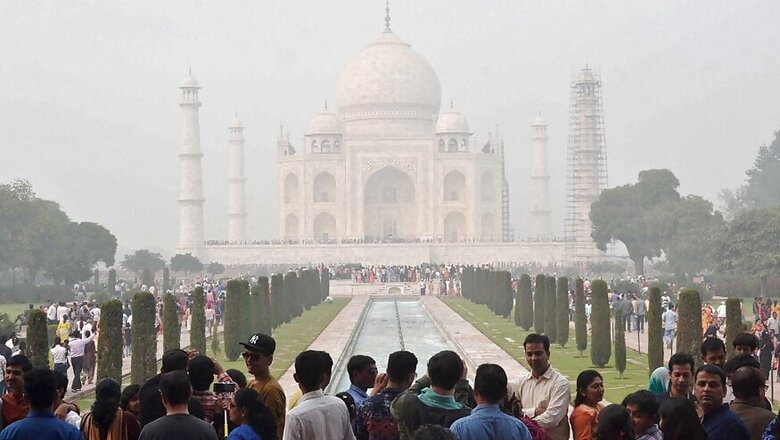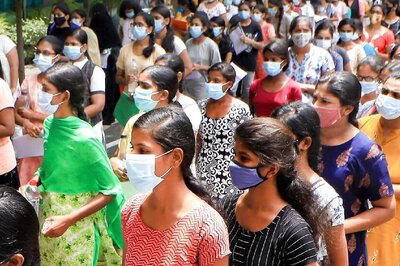
views
New Delhi: As police try their best to ensure security at top tourist sites in India, domestic and international travellers seem to have been apprehensive in the wake of violent protests since December 12 when Parliament passed the Citizenship Amendment Act with a majority. The situation led to at least seven countries issuing travel warnings.
According to a report by international news agency Reuters, officials estimate about 200,000 domestic and international tourists cancelled or postponed their trip to the Taj Mahal in the past two weeks, one of the world's most popular tourist attractions.
"There has been a 60% decline in visitor footfalls in December this year," said Dinesh Kumar, a police inspector overseeing a special tourist police station near the Taj Mahal who has access to visitor data. He said the decline was compared to December last year.
"Indian and foreign tourists have been calling our control rooms to check security. We assure them protection, but many still decide to stay away," Kumar was quoted as saying.
The report further said that a group of European tourists travelling in a group across India said they now planned to cut short their 20 day trip. "We are all retired folks, for us travel has to be slow and relaxing. The newspaper headlines have led to a sense of concern and we will leave sooner than we had planned," said Dave Millikin, a retired banker living on the outskirts of London, who spoke to Reuters from New Delhi.
The Taj Mahal, situated in Uttar Pradesh's Agra, attracts over 6.5 million tourists every year, generating nearly $14 million (nearly Rs 1.4 crore) annually from entrance fees. A foreign tourist pays Rs 1,100 (about $15) to enter the grounds, although nationals from neighbouring countries get a discount.
Managers in luxury hotels and guest houses around the Taj Mahal were quoted as saying that last minute cancellations during the festive season have further dampened business sentiment at a time when the country's economic growth has slowed to 4.5%, its slowest pace in more than six years.
In a bid to clamp down on violence and unrest, authorities have suspended mobile internet services in Agra.
"Blocking the internet has affected travel and tourism in Agra by about 50-60%," said Sandeep Arora, president of the Agra Tourism Development Foundation that groups over 250 tour operators, hotels and guides.
The United States, Britain, Russia, Israel, Singapore, Canada and Taiwan have issued travel advisories asking their citizens to either refrain from visiting or to exercise caution when visiting regions embroiled in protests.
Jayanta Malla Baruah, the head of the Assam Tourism Development Corp., said the state, home to the world's largest concentration of one-horned rhinoceroses, is visited on average by 500,000 tourists during December. "But this time, due to the ongoing protests and travel advisories by various countries, the number is down by 90% if not more," Reuters quoted him as saying.
Another report by a leading national newspaper stated that Goa, the world-famous beach belt, is witnessing a sharp decrease in tourism this year, with shack operators already labelling it as "flop season". The report said that it is suspected that there is a fall in business by more than 50% vis-a-vis last season.
The reason for downfall in the number of tourists has been attributed to several factors like collapse of Thomas Cook, unrest in country due to anti-Citizenship Act protests and economic slowdown to an extent.
The report stated that The Travel and Tourism Association of Goa (TTAG) has confirmed that there has been an overall drop in foreign tourists. "Occupancy at hotels could be as low as 50%," president Savio Messias was quoted as saying. Agreeing with Messias, shack owners' welfare society (SOWS) president Cruz Cardozo said, "The season has been very bad. There are hardly any tourists. The dip in arrivals could be more than 50%."
Anthony Silva, a shack owner, believes that slowdown in India's economy has further added to their woes. "With India’s economy affected, how would Indians be able to afford a good holiday even for less than a week?" he asked
Silva was further quoted as saying that domestic tourists this year don't have much spending power. "They have drinks and eat masala papad," he said.
Those running small eateries and stalls are largely patronised by low-budget domestic tourists, who "bargain over everything". "Instead of buying shorts (which are very cheap anyway), they want to hire the shorts for a few hours to walk on the beach, and offer Rs 25-30 as rent," Damien Teles, who runs a stall at Candolim beach, was quoted as saying.
"We sell sunglasses for Rs 100, but they bargain and want them for Rs 50-60," he said. "When we refuse to lower the price, they put on the sunglasses, click selfies, and give the sunglasses back." He said that he has never seen a Christmas season as depressing as the current one.




















Comments
0 comment